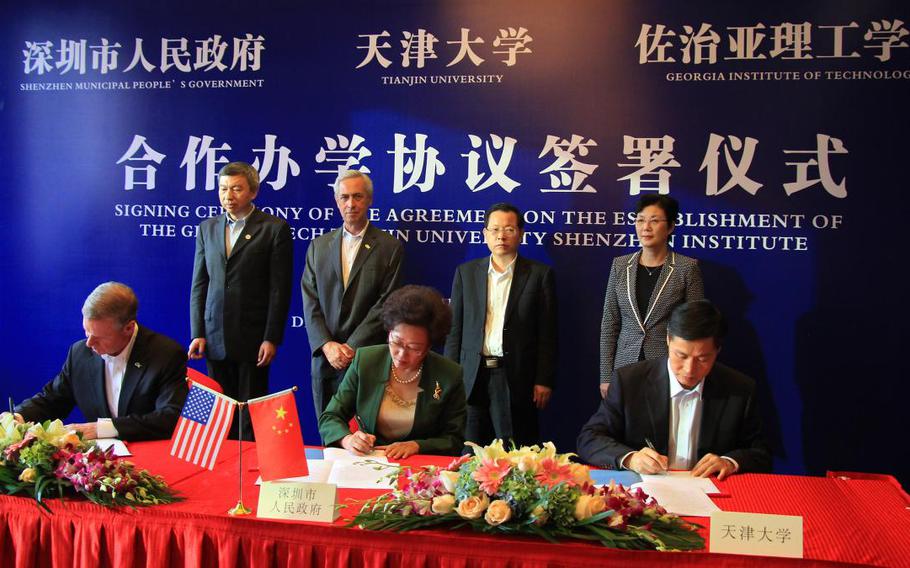
Georgia Tech President G.P. “Bud” Peterson, seated left, signed an agreement in a ceremony in Shenzhen, China, Dec. 2, 2016, to create a new collaboration with the City of Shenzhen and Tianjin University. Co-signers are Vice Mayor Yihuan Wu of Shenzhen Municipal People’s Government, center, and Tianjin University President Denghua Zhong, right. Tianjin University was put on a U.S. government blacklist in 2020. (Georgia Institute of Technology via House Select Committee on the CCP)
The Georgia Institute of Technology will end a partnership with a blacklisted university in China that lawmakers say has ties to the Chinese military and shut down its degree programs there, school officials announced Friday.
The announcement comes after some lawmakers had charged that Georgia Tech may have damaged national security through its partnership with Tianjin University in Shenzhen, just north of Hong Kong.
Steven McLaughlin, provost and executive vice president for academic affairs at Georgia Tech, said Friday that concerns raised by lawmakers in a letter sent to the school’s president in May “are all unfounded.” But given several factors — including a problematic partnership, geopolitics and pending legislation — the Georgia Tech Shenzhen Institute became untenable, he said.
In 2016, the public research university partnered with Tianjin University and the Shenzhen Municipal Government to establish the Georgia Tech Shenzhen Institute. It primarily teaches students pursuing master’s degrees in engineering and other programs, and summer study-abroad students. The students come from all over the world. Georgia Tech had hoped to one day have as many as 3,000 students there. But in 2020 Tianjin University was put on a U.S. government blacklist — the Commerce Department’s Entity List — for allegedly stealing American technology with military applications, according to lawmakers.
At that point, Georgia Tech began assessing its partnerships in China, canceled plans to add Ph.D programs and capped the number of students at 10 percent of its original goal. But Tianjin University remains on the Entity List, making the partnership infeasible, school officials said.
A spokesperson for Tianjin University could not immediately be reached for comment Friday.
Pending federal legislation would bar U.S. universities that collaborate with institutions on the Entity List from receiving any Defense Department funding, McLaughlin said.
The Georgia Tech Research Institute receives hundreds of millions of dollars a year from the federal government, McLaughlin said. “We’re a huge recipient of DOD funding, and national security is a huge priority for us,” he said.
In May, Rep. John Moolenaar (R-Mich.) announced that the House Select Committee on the Chinese Communist Party, the Senate Armed Services Committee, and the House Committee on Education and the Workforce were launching an investigation into Georgia Tech and its relationship with Tianjin University.
The committee said that the partnership was particularly troubling since the Georgia Tech Research Institute works with the Department of Defense to solve national security problems.
Lawmakers asked school leaders for information about Georgia Tech’s relationship with the Chinese university, including its funding, in a letter to Georgia Tech President Ángel Cabrera. They contended that Tianjin University is deeply embedded in a Chinese military-civil fusion “under which purportedly civilian companies, universities, and technologies are leveraged for military ends.”
Georgia Tech and Tianjin University had almost no collaboration, according to Georgia Tech officials, “and certainly no institutional research collaboration.” They weren’t doing research at the site and didn’t use U.S. federal funds there, McLaughlin said.
McLaughlin said university officials had answered all of the lawmakers’ questions. “We’re in the business of educating our students,” he said, and that’s what was happening at the Shenzhen site.
“Supporting the Chinese government in any way, shape or form?” he said. “… Absolutely, emphatically, no.”
The decision to exit the partnership wasn’t easy, he said. “It’s a front-row seat to one of the most exciting places in the world, that we think our students should see and experience and understand in light of the world that they’re going to live in. It’s so incredibly important to our students to have those kinds of experiences.”
Sixty percent of Georgia Tech students have some kind of study-abroad experience, he said. “That’s the heart and soul of why we were there.”
But, he said, like other universities, they are reassessing their relationship with China.
Rep. Virginia Foxx (R-N.C.), the chair of the House Education and Workforce Committee, said Friday that she hopes other universities follow Georgia Tech’s lead.
“The captain of the Titanic didn’t get a gold star for passing out life vests, and it shouldn’t have taken a congressional investigation to spur Georgia Tech to end its partnership with a blacklisted Chinese entity,” she said in a written statement. “Nonetheless, we’re glad that Georgia Tech has made the right call.”
Students who were studying at the site in Shenzhen will be able to complete their degrees — perhaps at Georgia Tech’s campus in Atlanta or another site, school officials said. And the university will continue to offer global experiences to students, including in Shenzhen, they announced Friday.
“Connecting globally remains one of our core values,” McLaughlin said.